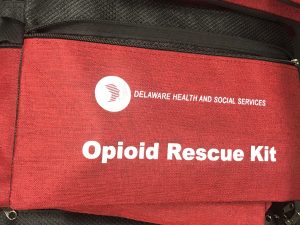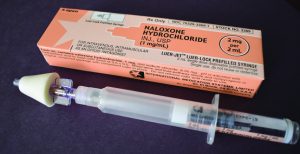Health Officials Fear Rising Death Toll May Be Consequence of COVID-19
NEW CASTLE (June 16, 2020) – In what Department of Health and Social Services (DHSS) officials fear may be a consequence of the uncertainty associated with the COVID-19 pandemic, deaths from suspected overdoses in Delaware during May tied a previous monthly total set in 2018, according to death investigation reports from the Division of Forensic Science.
In May 2020, 39 people died from suspected overdoses in Delaware. That ties the previous monthly high total set in August 2018. Among the 39 deaths in May, 20 were from New Castle County, 14 from Sussex County and five from Kent County.
Through May 31, 160 people have died from suspected overdoses in Delaware. That total is a 60% increase over a similar period in 2019 and a 48% increase over the same period in 2018.
“We are worried about the impact that COVID-19 is having on Delawareans who already are struggling with substance use disorder,” said DHSS Secretary Dr. Kara Odom Walker, a practicing family physician. “The pandemic is difficult for all of us emotionally, but none more so than people struggling with addiction, mental illness or both. And with such public health measures as social distancing in place to reduce people’s risk for COVID-19, treatment referrals for those with substance use disorder can be more difficult to access and the actual treatment can look different than what people are used to receiving.”
To help Delawareans cope with stress and address behavioral health needs during the coronavirus pandemic, DHSS’ Division of Substance Abuse and Mental Health in May launched the 24/7 Delaware Hope Line – a single point of contact where callers can connect to a variety of resources and information, including support from clinicians and peer specialists plus crisis assistance. For support, Delawareans can:
- Reach the free Hope Line at 1-833-9-HOPEDE or 1-833-946-7333.
- Get behavioral health tips and reminders by texting DEHOPE to 55753.
- Search for treatment services and resources in Delaware or nearby states at DHSS’ one-stop website, HelpIsHereDE.com.
Elizabeth Romero, director of the Division of Substance Abuse and Mental Health (DSAMH), urged individuals in active substance use to consult with a medical provider immediately or to call the Delaware Hope Line to be connected to trained crisis professionals who can discuss treatment options. “We know this pandemic has been especially difficult for those with substance use disorder,”
Romero said. “The Hope Line can help. Every call is answered by a trained crisis counselor, 24/7, ready to assist you in any way.”
Romero said the division is preparing for the correlating wave of despair with providers and increasing access to care and flexibility with telehealth. DHSS’ Division of Substance Abuse and Mental Health and Division of Public Health also have teamed up with several partners across the state to provide naloxone, a medication that can reverse an opioid overdose. A key partnership with the Food Bank of Delaware provides drive-through food pantry and life-saving naloxone distribution. These events will happen across the state in the upcoming weeks. “If you have a loved one with substance use disorder, please have naloxone on hand,” Romero said.
The increase in deaths from suspected overdoses during the first half of 2020 follows another increase in overdose deaths for all of 2019. In its annual report for 2019, the Division of Forensic Science reported 431 overdose deaths, an increase of almost 8% over 2018. The 431 deaths by county:
- New Castle County: 278
- Sussex County: 100
- Kent County: 53
Of the 431 total deaths, the Division reported that 341 (79%) involved fentanyl, a synthetic pain reliever that is 50-100 times more potent than morphine. The percentage of total cases in 2019 involving fentanyl was 5 percentage points higher than in 2018.
Romero encouraged anyone who is using or suffering from addiction to call for help, see a medical provider, or ask a police officer or another first responder for help. “Too many times, our police officers, EMTs and other first responders see first-hand the dangers of overdoses,” she said. “Our first priority is to save lives.”
Under Delaware’s 911/Good Samaritan Law, people who call 9-1-1 to report an overdose and the person in medical distress cannot be arrested for low-level drug crimes.
Division of Public Health Director Dr. Karyl Rattay urged those in active use to get naloxone through one of DSAMH’s Bridge Clinics, at a participating pharmacy – where no prescription is required – or at a naloxone training.
“Naloxone saves lives,” said Division of Public Health Director Dr. Karyl Rattay. “We urge anyone who needs access to naloxone to go to a Bridge Clinic, a training class or distribution event, or to a participating pharmacy to buy the overdose-reversing medication. We also encourage Delawareans to download OpiRescue Delaware, a smartphone app that provides lifesaving step-by-step instructions on how to respond to an overdose, including administration of naloxone.” To find the Bridge Clinic in your county, training or distribution events, or a participating pharmacy, go to HelpIsHereDE.com, and click on the overdose prevention tab.

